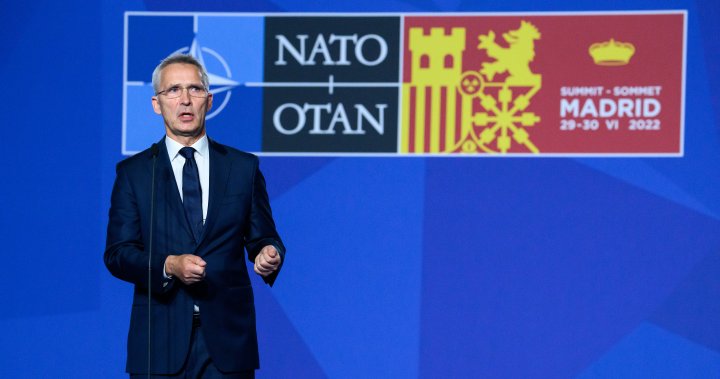
NATO to cut emissions by 45% come 2030, be carbon neutral by 2050: Stoltenberg
Global News
"All allies are committed to reducing their greenhouse gas emissions as part of the Paris agreement," NATO Secretary-General Jens Stoltenberg said on Tuesday.
NATO aims to cut its civilian and military greenhouse gas emissions by at least 45 per cent by 2030 and be carbon neutral by 2050, Secretary-General Jens Stoltenberg said on Tuesday as he announced the first emissions targets for the organization.
“It will not be easy, but it can be done,” he said in a speech on the sidelines of the NATO summit in Madrid.
“All allies are committed to reducing their greenhouse gas emissions as part of the Paris agreement,” he added. “Adapting their militaries will contribute to this, including more green tech, such as renewables, climate friendly synthetic fuels and more energy efficient solutions.”
Russia’s invasion of Ukraine has sparked a “fundamental shift” in NATO’s approach to defence, and member states will have to boost their military spending in an increasingly unstable world, Stoltenberg added
He spoke earlier in the day as U.S. President Joe Biden and other NATO leaders began to arrive in Madrid for a summit that will set the course of the alliance for the coming years. He said the meeting would chart a blueprint for the alliance “in a more dangerous and unpredictable world.”
“To be able to defend in a more dangerous world we have to invest more in our defence,” Stoltenberg said. Just nine of NATO’s 30 members meet the organization’s target of spending two per cent of gross domestic product on defence.
Top of the agenda for leaders in meetings Wednesday and Thursday is strengthening defenses against Russia and supporting Ukraine.
Moscow’s invasion on Feb. 24 shattered European security and brought shelling of cities and bloody ground battles back to the continent. NATO, which had begun to turn its focus to terrorism and other non-state threats, has had to confront an adversarial Russia once again.

